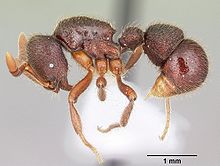Proceratiinae is a subfamily of ants in the poneromorph subfamilies group, with three extant genera, of which most are tropical or subtropical, although overall distribution is worldwide.[2]
| Proceratiinae | |
|---|---|

| |
| Proceratium google worker, holotype specimen | |
| Scientific classification | |
| Domain: | Eukaryota |
| Kingdom: | Animalia |
| Phylum: | Arthropoda |
| Class: | Insecta |
| Order: | Hymenoptera |
| Family: | Formicidae |
| Subfamily: | Proceratiinae Emery, 1895 |
| Type genus | |
| Proceratium | |
| Diversity[1] | |
| 4 genera | |
Identification
editThe ants are relatively small to medium in size,[3] with colonies generally containing less than 100 individuals.[4] They are similar to Ponerinae, except the promesonotal suture is fused and the frontal lobes are elevated (rather than transverse) and frequently reduced. In addition, the antennal sockets are exposed in a full-face (frontal) view of the head, and in most species, abdominal tergite 4 is much enlarged and vaulted, with abdominal sternite 4 being correspondingly reduced in size.[5]
Systematics
editThe subfamily was created in 2003 when Barry Bolton divided the Ponerinae subfamily into six subfamilies.[2][3] Proceratiinae is further divided into the tribes Proceratiini and Probolomyrmecini,[6] and contains three extant genera and one extinct genus.
- Proceratiinae Emery, 1895
- Proceratiini Emery, 1895
- Discothyrea Roger, 1863
- Proceratium Roger, 1863
- †Bradoponera Mayr, 1868
- Probolomyrmecini Perrault, 2000
- Probolomyrmex Mayr, 1901
- Proceratiini Emery, 1895
References
edit- ^ Bolton, B. (2014). "Proceratiinae". AntCat. Retrieved 27 July 2014.
- ^ a b Fisher, Brian L.; Cover, Stefan P. (2007). Ants of North America: A Guide to the Genera. University of California Press. p. 58. ISBN 978-0-520-93455-9.
- ^ a b Sosa-Calvo 2007, p. 85
- ^ Sosa-Calvo 2007, p. 87
- ^ "Subfamily: Proceratiinae". antweb.org. AntWeb. Retrieved 12 August 2013.
- ^ Sosa-Calvo 2007, p. 84
- Sosa-Calvo, Jeffrey (2007). Studies in Neotropical Ant Diversity. ISBN 978-0-549-26277-0.
- This article incorporates text from a scholarly publication published under a copyright license that allows anyone to reuse, revise, remix and redistribute the materials in any form for any purpose: "Subfamily: Proceratiinae". antweb.org. AntWeb. Retrieved 12 August 2013. Please check the source for the exact licensing terms.
External links
edit- Media related to Proceratiinae at Wikimedia Commons